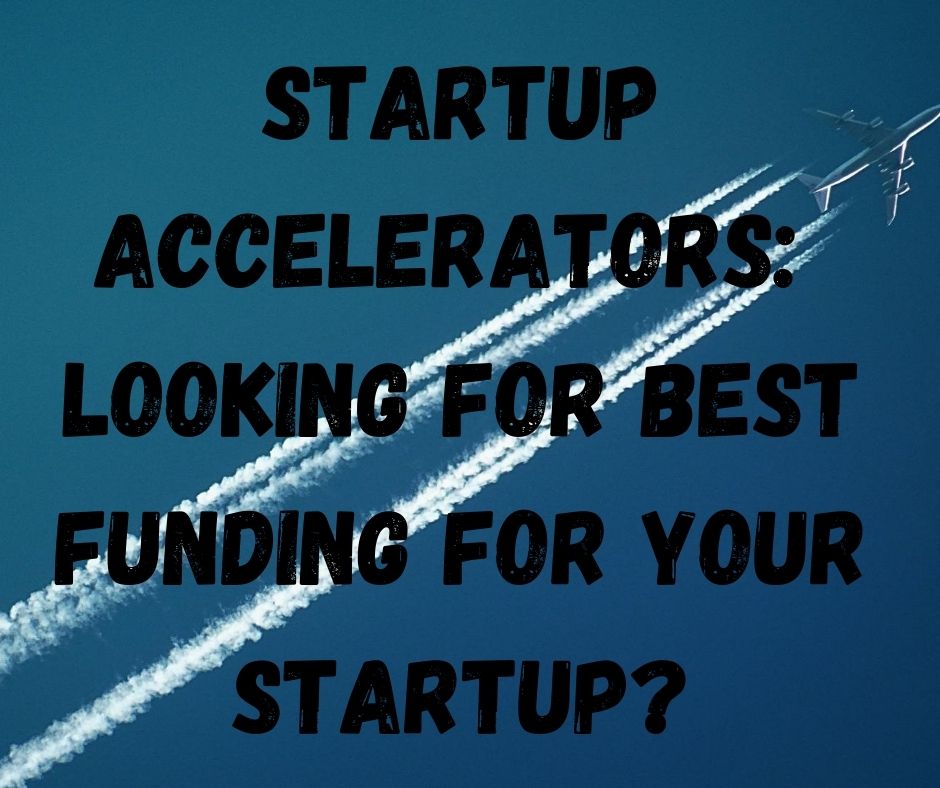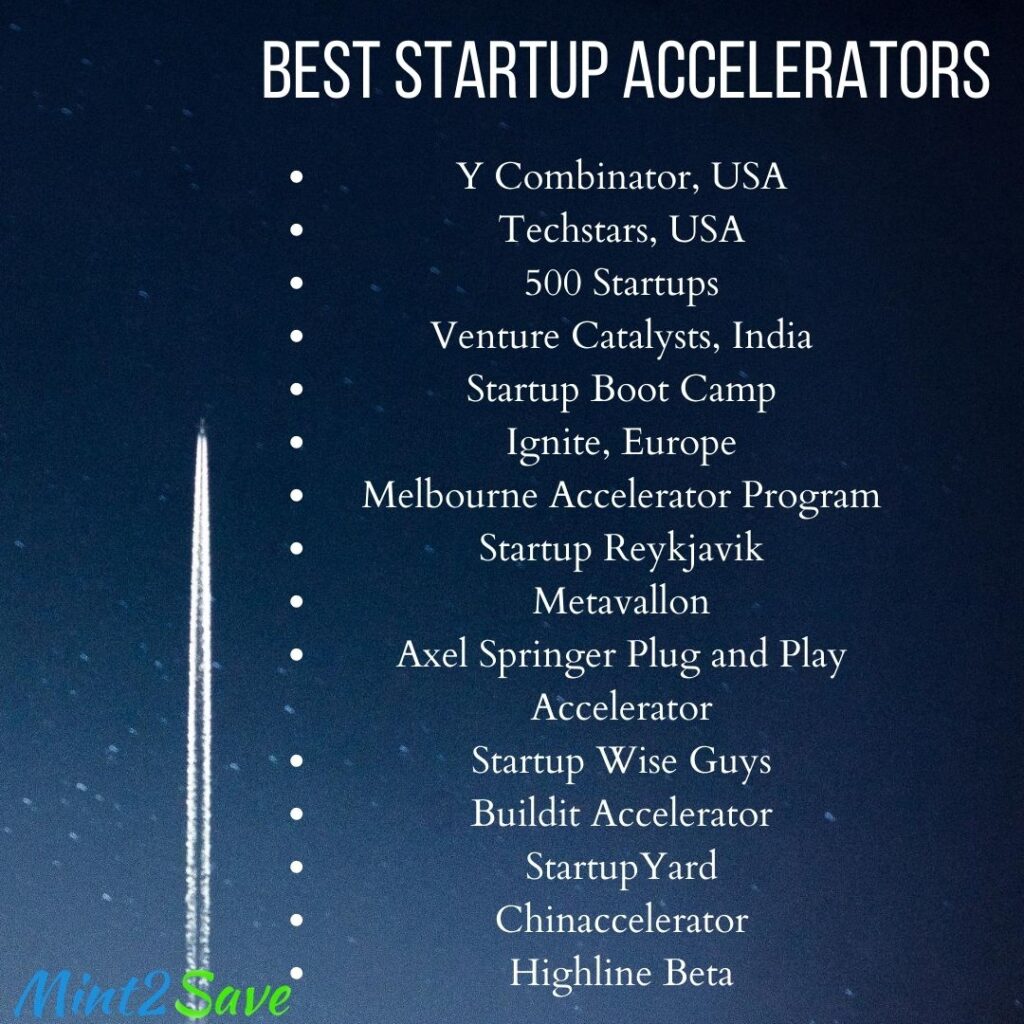Startup Accelerators: Looking for the best funding for your Startup?
- 8 August 2020 | 1370 Views | By Mansi Jain

Throughout the entire world, a new industry is taking hold, known as Startup Accelerators which is helping the entrepreneurs with access to resources and providing financial support so that their startups can be turned into a lasting business. Although, this is not entirely new, but it is playing a key role in the growth of entrepreneurial ventures.
By the definition, Startup Accelerators also known as Seed Accelerators, are programs that serve as short term business incubators for startup companies in their in-investment portfolio. To elaborate, these are fixed-term cohort programs, that include mentorship and educational components and culminate in a public pitch event or demo day. Now, a question pops up in mind i.e., how is a startup accelerators different from business incubators. Business incubators are generally government-funded and mainly focus on biotech, fintech, MedTech, cleantech, or product-centric industries while accelerators may be public or private companies with a focus on a wide range of industries. Unlike business incubators, the application process of seed accelerators is open to anyone but is highly competitive.
How many startup accelerators are there in the world?
These startup accelerators have backed up some of the world’s best startups. They form a great launchpad for entrepreneurs who want to establish a robust and scalable business. These accelerators and incubators provide the startups with a working space, mentorship, investment and more. According to Hackernoon and data from the International Business Innovation Association, there are now around “7,000 business incubators and accelerators. More than 90 percent of them are non-profit and focused on incubator programs for community economic development.”
What are the Best Startup Accelerators?
Here are some of the best startup accelerators worldwide:
- Y Combinator, USA
- Techstars, USA
- 500 Startups
- Venture Catalysts, India
- Startup Boot Camp
- Ignite, Europe
- Melbourne Accelerator Program
- Startup Reykjavik
- Metavallon
- Axel Springer Plug and Play Accelerator
- Startup Wise Guys
- Buildit Accelerator
- StartupYard
- Chinaccelerator
- Highline Beta
Now you may wonder, how do the Startup Accelerators help the startups succeed? Here are five ways through which the startup accelerators create a path of success and help the startups conquer the business challenges:
1. Provides an Ecosystem for growth and support:
Seed Accelerators often provide additional support services that are interested in advising early-stage startups. The services include law firms, patent attorneys, regulatory experts, and CFO services. These services are provided pro-bono or at a discounted price. This is one of the most invaluable offerings provided by the seed accelerator. Some of the accelerators are designed with a focus on a particular industry such as Dreamit health, Luminate, Rebel bio while some are designed to bring an early-stage startup in an already existing ecosystem of experts such as Luminate, 43North and NDRC.
2. Develop Skills and Build Plans for startups:
When we are new to the business environment or as a new entrepreneur, we may lack a good understanding of one or more areas of operations. As a founder, you may find the tools and strategies that work for large corporations or businesses but are generally useless when applied to a new startup or a growing business. These seed accelerators help the teams to build strategies, Business plans, a five-year financial forecast, sales and marketing strategy and a roadmap for technology. It also helps the new startups in identifying gaps and build a short term as well as long term hiring strategy.
3. De-Risk the Startups:
An accelerator makes some twists and turns to a program according to the type of startups. This is mainly done to identify the inborn risks to its growth in the market in terms of fit and quality, recruiting, sales, marketing, competition, and funding. As the initial funding in a startup is done by these accelerators, it gives the investors such as Angel investors a sense that graduating from the accelerators de-risks the business plan, sales and marketing strategy, and a technology roadmap.
4. Funding:
One of the main aspects of a startup accelerator that is often ignored is the actual money that they invest in the super early stage of the new startups. These help the founding team a few months of runway, this also helps them to prove that someone is interested to put in money and have their backs. Along with the pitching to traditional VC firms, seed accelerators play a major role in mentoring the founders on how to apply for the government grants (Such as Small Business Innovation Research grants in U.S. and Horizon2020 in the EU). Some of the seed accelerators are particularly designed to help startup to secure these grants.
5. Inroads into a Global Network:
An accelerator can also help the startups to go global through a leverage of their wider community of peers all over the world which is known for their expertise, experience, and contribution. This can provide the new startups with strategic support along with human and financial capital and unparalleled networking. The accelerators can help them enter the real-world with a strong foothold.
With the mentorship of accelerators, startups can take a firm and deep rooting, become established brands, and make their mark. As said by Sujatha Ramanujan. Managing Director, Luminate Accelerator, New York “Accelerators provide infrastructure, support, and training that would otherwise be time-consuming for start-ups. Accelerators also provide access to an entire ecosystem that supports a start-up that may otherwise feel isolated”.
As already discussed, the accelerators can prove to be an invaluable support in the success of the startups and the founders. However, the three key questions make someone new in business scratch their heads.
- How do accelerators work and make money?
- How much does a cohort or accelerator program cost?
- What an accelerator funds and what percentage of equity does an accelerator takes in a startup?
The Startup Accelerator Process:
The Process is divided into several steps, and before you register or learn about the program you need to set up your business legal structure.
-
Application Process:
You can apply to the program online after going through the requirements and instructions on the accelerator’s website. Once the application is submitted, the management will be in touch with you throughout the entire process and will help you with all the relevant details and guidance needed. Although you need to have a basic business plan and some financial forecasting ready. Some of the top Accelerators such as Y- combinator accepts companies at a wide range of stages and into batches. Cruise, for example, had just been working on their idea for two weeks when they applied to Y- Combinator.
The application process seems to be quite easy but the chances of getting accepted into the program are slim as the acceptance rate of the program is on 1-3%.
-
Get Funded:
One of the main reasons the new startups and small businesses choose these programs is because they provide funds to help the new startups launch their operations. Accelerators typically offer money or fund the startups in exchange for equity in the company. Although before accepting the funds think twice about the proportion of the company you are willing to give up. It may seem like a small piece of the company now but maybe a substantial amount later and will have an impact on future fundraising rounds.
Now, most accelerators generally have a non- negotiable equity share percentage of 4%-7%. One of the top accelerator Y-Combinator invests about $150K and takes about 7% equity share in a company. So, if you go about, it generally depends on the accelerators and the amount of investment or funding they are willing to make in a business.
-
Focus:
Once the registration completes, the main advantage of this program is that the entrepreneurs must dedicate their entire attention to the implementation of the business idea and growth strategies. According to Harvard Business Review, this is 3-6 months process which is normally on-site with co-workspace provided.
-
Learning:
This support program is mainly popular for the learning opportunities and free mentorship that they provide. Along with it, you get to attend multiple workshops and seminars which includes the topics of business such as how to launch your business effectively, legal obligations of the company, and many more.
-
Networking opportunities:
During this period the entrepreneurs get plenty of opportunities to network with their peers, other industry support providers, and potential investors. This may prove invaluable for future fundraising.
-
Demo Day:
At the end of the program accelerators culminate in a graduation generally referred to as “Demo Day”. On this day Startup owners or founders are expected to present their pitch decks in front of many investors, business strategist, media partners. They just have a few minutes to present their ideas which is usually present in a form of 15-20 slides.
What’s the cost?
Now one may wonder how much does an accelerator program cost. Most startup accelerators indirectly charge the startups as they pay with equity and often as part of the capital that they get. There are variations in how it is done.
Then there are zero equity accelerators who charge for the participation. Most of them however also invest in the new startups or small business. The payment here is basically to avoid having “accelerator tourists” meaning startups who travel from one accelerator to the next and do nothing but clog the classes.
No matter how, there is no free lunch. Either the startups must consider the corporate interests for the equity they give up or the payments they must make. But if an independent accelerator spends time, resources, and money to make a startup successful, they want rightfully to participate in the success they helped to co-create.
To manage the program, support the startups and recruit, select and engage the local community and ecosystem of entrepreneurs cost money which usually costs around $400K in the US and in other countries around $250K a year. There are different ways of how an accelerator raises the money to cover up its operating costs. Let’s look at the different ways an accelerator raises the money:
- Sponsorship: This is one of the most frequently used means. A sponsor can be a large corporate or a local government. Sometimes a local legal, accounting, and real estate firms may sponsor the accelerators who wish to target the entrepreneurs with their products and services.
- Events: As we discussed, that these accelerators provide networking opportunities to the new startups. To run such events, they charge the attendees a nominal fee to cover the charges.
- Entrepreneur in residence: Some accelerators run the EIR program for the employees of large companies to help them learn how to be more entrepreneurial. These programs are generally for a 6-12 months period and the accelerators charge around $25K to $50K for them.
- Grants: To support entrepreneurship which helps promote local jobs, Local economy the government and private donors typically give grants to these accelerators.
There are many other ways in which these accelerators raise money which may include writing research reports such as syndicated report based on their startup data for large companies, conducting training by joining in with Code academies and hacker schools, innovation scouting for larger companies, providing distribution designing, sales and marketing consultations.
Are startup accelerators worth it?
Accelerators certainly are not a panacea that’ll lead to immediate success. That said, accelerators can provide important early validation of your idea/team as most accelerators worth their weight and have good filtering processes.
The studies show that start-ups that successfully complete a seed accelerator program are more likely to stay in business (87% as compared to the average success rate of 44% for all companies, per the U.S. Small Business Administration). So that’s a pretty compelling argument for considering such a program.
There are many advantages to joining an incubator or accelerator program — in addition to the seed money. Incubators provide access to business resources; help forge connections and provide strong mentors. There are intangible benefits as well, such as the confidence and reputation boost founders may get as part of a high-profile entrepreneurial community.
However, the most important thing to remember for early-stage founders is that the top three global accelerators Y Combinator, 500 Startups, and Techstars report about ten percent of their portfolio companies as successful exits, according to Forbes. The percentage of successful exits quickly drops to one to two percent in the case of the top 10 global accelerators such as Plug and Play, SOSV, Startupbootcamp, MassChallenge, Wayra, and NDRC. So, getting into an accelerator is by no means a clear indication of success. It often is the first important stepping stone towards building a successful business.
Find out some of the best startups groomed in Europe: Top European Fintech Startups You Must Know










